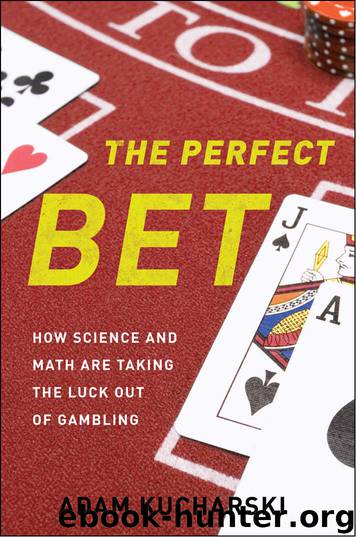The Perfect Bet: How Science and Math Are Taking the Luck Out of Gambling by Adam Kucharski

Author:Adam Kucharski [Kucharski, Adam]
Language: eng
Format: epub
ISBN: 9780465098590
Publisher: Basic Books
Published: 2016-02-22T23:00:00+00:00
WHEN THE US CONGRESS put forward a bill in 1969 suggesting that cigarette advertisements be banned from television, people expected American tobacco companies to be furious. After all, this was an industry that had spent over $300 million promoting their products the previous year. With that much at stake, a clampdown would surely trigger the powerful weapons of the tobacco lobby. They would hire lawyers, challenge members of Congress, fight antismoking campaigners. The vote was scheduled to take place in December 1970, which gave the firms eighteen months to make their move. So, what did they choose to do? Pretty much nothing.
Far from hurting tobacco companies’ profits, the ban actually worked in the companies’ favor. For years, the firms had been trapped in an absurd game. Television advertising had little effect on whether people smoked, which in theory made it a waste of money. If the firms had all got together and stopped their promotions, profits would almost certainly have increased. However, ads did have an impact on which brand people smoked. So, if all the firms stopped their publicity, and one of them started advertising again, that company would steal customers from all the others.
Whatever their competitors did, it was always best for a firm to advertise. By doing so, it would either take market share from companies that didn’t promote their products or avoid losing customers to firms that did. Although everyone would save money by cooperating, each individual firm would always benefit by advertising. Which meant all the companies inevitably ended up in the same position, putting out advertisements to hinder the other firms. Economists refer to such a situation—where each person is making the best decision possible given the choices made by others—as a “Nash equilibrium.” Spending would rise further and further until this costly game stopped. Or somebody forced it to stop.
Congress finally banned tobacco ads from television in January 1971. One year later, the total spent on cigarette advertising had fallen by over 25 percent. Yet tobacco revenues held steady. Thanks to the government, the equilibrium had been broken.
Download
This site does not store any files on its server. We only index and link to content provided by other sites. Please contact the content providers to delete copyright contents if any and email us, we'll remove relevant links or contents immediately.
| Computer Vision & Pattern Recognition | Expert Systems |
| Intelligence & Semantics | Machine Theory |
| Natural Language Processing | Neural Networks |
Algorithms of the Intelligent Web by Haralambos Marmanis;Dmitry Babenko(18334)
Jquery UI in Action : Master the concepts Of Jquery UI: A Step By Step Approach by ANMOL GOYAL(10487)
Test-Driven Development with Java by Alan Mellor(7768)
Data Augmentation with Python by Duc Haba(7641)
Principles of Data Fabric by Sonia Mezzetta(7409)
Learn Blender Simulations the Right Way by Stephen Pearson(7323)
Microservices with Spring Boot 3 and Spring Cloud by Magnus Larsson(7162)
Hadoop in Practice by Alex Holmes(6753)
RPA Solution Architect's Handbook by Sachin Sahgal(6540)
The Infinite Retina by Robert Scoble Irena Cronin(6249)
Big Data Analysis with Python by Ivan Marin(5971)
Life 3.0: Being Human in the Age of Artificial Intelligence by Tegmark Max(5558)
Pretrain Vision and Large Language Models in Python by Emily Webber(4927)
Infrastructure as Code for Beginners by Russ McKendrick(4681)
Functional Programming in JavaScript by Mantyla Dan(4562)
WordPress Plugin Development Cookbook by Yannick Lefebvre(4424)
The Age of Surveillance Capitalism by Shoshana Zuboff(4293)
Embracing Microservices Design by Ovais Mehboob Ahmed Khan Nabil Siddiqui and Timothy Oleson(4180)
Applied Machine Learning for Healthcare and Life Sciences Using AWS by Ujjwal Ratan(4162)
